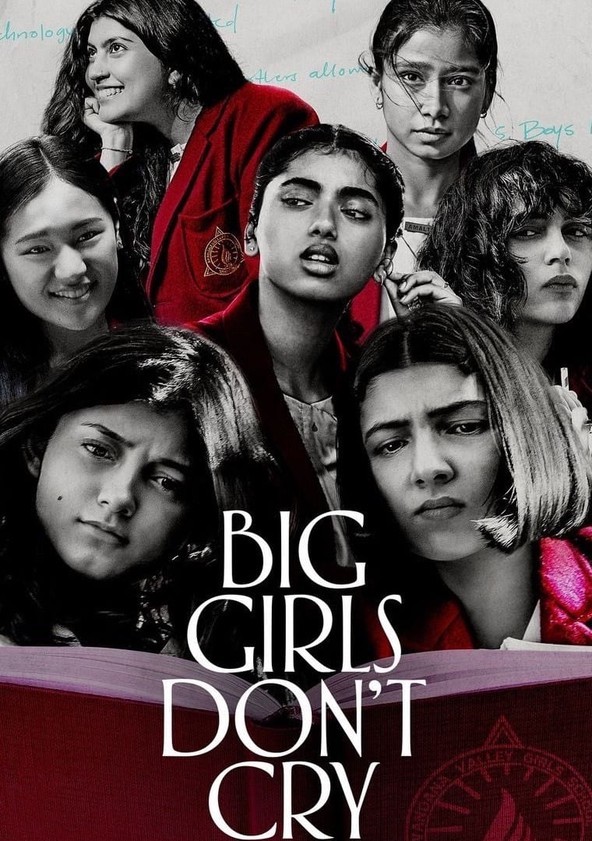Big Girls Don't Cry(Season 1)
Introduction
The opposite of patriarchy is not matriarchy but equality. These were the words that Kiran Rao had shared in her recent interview with Lallantop, something that has stuck on with me ever since. The point is that you don’t replace a dominating gender with another one but instead create a world and an environment that is equal to both genders. And that for me is feminism, it stands for equality, something that I have consciously tried to follow as well. The same when showcased on celluloid is often criticized and labelled as being ‘woke’ whereas content related to patriarchy is either passed off as a comedy or even normalized to a point of reception for the viewers. I do feel this really needs a change in the mindset of watching and absorbing different kinds of content with an open mind. And one such Hindi show was out yesterday titled Big Girls Don’t Cry streaming on Amazon Prime that dealt with the plight of school girls staying together in a boarding school. So then does the first season of Big Girls Don’t Cry aka BGDC manage to impress, let’s find out.
Story & Screenplay
The first season of Big Girls Dont Cry follows the coming of age story of a bunch of school days staying in a boarding school who slowly begin to experience the controlling tactics of the school amidst all the fun and frolic. The story for me can be dissected in two extremes – the fun element in the drama and the commentary that it wishes to convey through the narrative. I feel that the drama was slightly skewed with its fun element simply because the events weren’t quite palatable and rather uninteresting given also that they didn’t quite have anything new to offer. But the story does score when the drama chooses to take itself seriously through some interesting anecdotes communicated through an efficient layer of commentary. All of it is packaged in a screenplay standing at 7 episodes ranging from 40 odd minutes to close to an hour that felt slightly longer than usual and honestly wasn’t the best. But if you are willing to overlook some of the frenzy to begin with, the backend of the drama shall reward you to an extent.
The drama opens with the introduction of all the principal players in the drama comprising of school girls and members of the staff, collectively residing at a boarding school. The interesting bit with respect to the characterization is that each character is given a different trait that would eventually add a different dimension to the drama. The flip side to that is that there are multiple threads that emerge right from the beginning, and honestly not all of them were interesting enough while also, the events were far too frivolous for my liking. It almost was to a point that I wished to abandon the show that felt like an instant disconnect to begin with. But there still was something in the drama that grabbed my attention thereby never completely disconnecting me from the drama. This was the trend right throughout the narrative, the payoff for which was in the backend of the show with some interesting arcs to conclude the drama.
The proceedings are just about decent to begin with, with a few standout sequences separated in the garb of some rather frivolous piece of writing. But what these sequences do is often get you back into the drama. These are the same sequences wherein the drama does choose to take itself seriously and communicate to the viewers on what it stands for while also exploring the suppressed and rebellious side of the characters, each of whom are facing issues with respect to their identity or friendship or a dysfunctional family. I really wished that the tone of the drama wasn’t switching between being frivolous to something more serious, and something that could easily have focused on the latter which would have had a better impact in the overall scheme of things. And I say that because the proceedings were pleasantly not preachy at all, often communicating the message through its layered references, be it in the form of a play or simply through undercurrent dynamics between characters. The fun element could invariably have been a part of the narrative without trying this hard, consciously!
The third act is where the frivolous nature of the drama is slowly ironed out and a part where you as a viewer would get your reward, should you choose to stick with the drama. All the arcs reach their conclusion in a rather heartwarming manner wherein there was a sense of subtlety in the drama with what it stood for and what it chose to communicate. And I liked how some of the tracks met with a rational solution without driving home the point of being against patriarchy in the purest sense. This was a matured piece of writing which was in such contrast to the writing at the start of the show. So if I were to look at the entire arc, it really did work although my criticism about overindulging in the frivolous tone of the drama stays. In other words, there were some ‘woke’ tracks that met with a practical solution, in a welcome tonal shift that made me wonder on what if the initial elements in the writing was controlled? Overall, the screenplay is decent but could really have hit a home run if it was better controlled, for the conclusion that does reward its viewers for their persistence.
Dialogues, Music & Direction
The dialogues do get the Gen Z lingo spot on but the impact of the lines is higher when the writing chooses to be profound. The music is outstanding here with so many songs gelling well with the narrative and capturing the vibe of the drama really well. The Ekla Cholo Re rendition at the end really hits home with the right kind of emotions and sentiments attached to it, and the song placement too was spot on. The BGM also compliments the vibe of the drama really well. The cinematography captures some wonderful frames including tight clossups that is intended to allow the viewers to peep into the psyche of the characters. The editing should have been sharper particularly with respect to ironing out the lags which were prevalent in the first half of the drama.
The director’s chair is shared by as many as four directors – Nitya Mehra, Karan Kapadia, Sudhanshu Saria and Kopal Naithani and while the direction was fair overall, I couldn’t help but think that the directors were one too many. The tonal shift in the drama could have also been attributed to the different styles of filmmaking on show here which wasn’t ideal to the overall impact of the drama. Had the number been reduced to two, I would think that perhaps the consistency of the drama with respect to its staging would have improved. This is not to say that the direction was bad in anyway(it definitely was decent) but more in the context of neutralizing the consistencies in the drama.
Performances
The performances are quite impressive by the ensemble cast. Raima Sen and Mukul Chadda as Roohi’s parents have their moments to shine, as do Shataf Figar as Bob, Shikha Chauhan, Ritika Gupta as Mithya, Kajal Chonkar as Tsering, Shradha Kaul as Noor’s mother, Khalid Siddiqui as Noor’s father, Arjun Mathur as Mittal and Pavleen Gujral as Kavya’s mother, all of whom are wonderful additions in the screenplay. Bodhisattva Sharma as Azad definitely makes his presence felt as does Angelika Sawhney as Sheetal who is quite stoic with her character in a good way. Zoya Hussain as Aliya is exceptional and she showcases her vulnerability of what she thinks versus what she is instructed to, in a rather subtle manner. Tanya Abrol as the PT teacher Amrit is funny to the core and she does a wonderful job. Suchitra Pillai and Lovleen Mishra lend good support.
Aditya Raj as Veer and Udit Pandey as Jojo are decent in their respective roles. Pooja Bhatt as Anita delivers a very dignified performance in a character that may have been subjected to suppression at some point in her life, and is simply following the same principles with her students at the behest of saving the school. Manjoree Kar as Manjoree is impressive in a nicely enacted character. Himanshi Pandey as Vidushi is terrific despite a limited screen time.
Akshita Sood as Dia is excellent in her character who is rebellious in a rather extreme manner, and I liked how the writers gave her character an arc to play with. Aneet Padda as Roohi showcases her emotional turmoil pretty well particularly towards the backend of the drama. Dalai as Pluggy also manages to impress despite her track being a little more frivolous to begin with. Lhakyila as JC has a striking personality and a pleasant screen presence in a job well done, overall. Avantika Vadanapu as Ludo aka Leah was a complex character to portray because of her insecurities with respect to her identity. And I thought Avantika was fabulous to watch. Vidushi as Kavya is confident and I liked how articulate and efficient she was in conveying her emotions. Afrah Sayed as Noor for me is the pick of the actors simply because her character had a dual personality of being immersed in duty so much so that she couldn’t care taking a stand. This while she wished to be rebellious in a non-existential issue wherein all her energies were diverted at the wrong place. This was an interesting conflict which was difficult to portray, and Afrah is outstanding in her act.
Conclusion
The first season of Big Girls Don’t Cry is a decent drama with good performances that scores when it chooses to be purposeful. I really wish that a little bit of the gloss and frivolous tone was diluted which would have made for a better impact. In other words, if you can sit through its messy gloss to begin with there are rewards to be had in the backend of the drama. Available on Amazon Prime.




